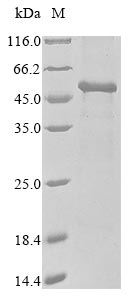Amino acids 31-390 constitute the expression domain of recombinant Human PDHA1. The theoretical molecular weight of the PDHA1 protein is 47.5 kDa. This protein is generated in a e.coli-based system. The PDHA1 gene fragment has been modified by fusing the N-terminal 10xHis tag and C-terminal Myc tag, providing convenience in detecting and purifying the recombinant PDHA1 protein during the following stages.
The human pyruvate dehydrogenase E1 component subunit alpha, somatic form, mitochondrial (PDHA1) is a key enzyme subunit involved in the pyruvate dehydrogenase complex, a crucial component of cellular energy metabolism. PDHA1 carries the E1 (pyruvate decarboxylase) enzymatic activity. PDHA1 plays a central role in regulating the entry of pyruvate into the citric acid cycle, influencing the overall rate of cellular energy production through aerobic respiration. Mutations in the PDHA1 gene can lead to pyruvate dehydrogenase complex deficiency, a rare genetic disorder associated with neurological and developmental abnormalities. PDHA1 deficiency is linked to metabolic disorders with neurological symptoms, such as Leigh syndrome. Understanding the structure and function of PDHA1 is crucial for elucidating the molecular basis of these disorders.




